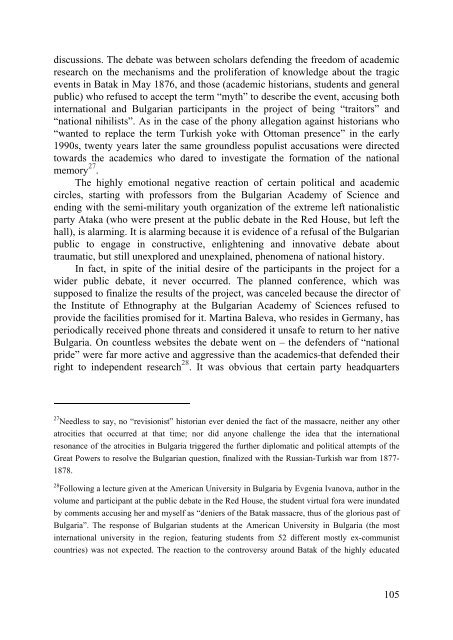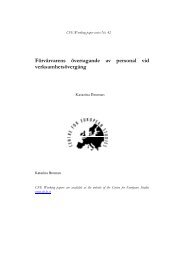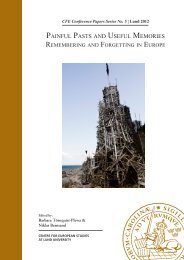MINNE OCH MANIPULATION - Centre for European Studies - Lunds ...
MINNE OCH MANIPULATION - Centre for European Studies - Lunds ...
MINNE OCH MANIPULATION - Centre for European Studies - Lunds ...
Create successful ePaper yourself
Turn your PDF publications into a flip-book with our unique Google optimized e-Paper software.
discussions. The debate was between scholars defending the freedom of academic<br />
research on the mechanisms and the proliferation of knowledge about the tragic<br />
events in Batak in May 1876, and those (academic historians, students and general<br />
public) who refused to accept the term “myth” to describe the event, accusing both<br />
international and Bulgarian participants in the project of being “traitors” and<br />
“national nihilists”. As in the case of the phony allegation against historians who<br />
“wanted to replace the term Turkish yoke with Ottoman presence” in the early<br />
1990s, twenty years later the same groundless populist accusations were directed<br />
towards the academics who dared to investigate the <strong>for</strong>mation of the national<br />
memory 27 .<br />
The highly emotional negative reaction of certain political and academic<br />
circles, starting with professors from the Bulgarian Academy of Science and<br />
ending with the semi-military youth organization of the extreme left nationalistic<br />
party Ataka (who were present at the public debate in the Red House, but left the<br />
hall), is alarming. It is alarming because it is evidence of a refusal of the Bulgarian<br />
public to engage in constructive, enlightening and innovative debate about<br />
traumatic, but still unexplored and unexplained, phenomena of national history.<br />
In fact, in spite of the initial desire of the participants in the project <strong>for</strong> a<br />
wider public debate, it never occurred. The planned conference, which was<br />
supposed to finalize the results of the project, was canceled because the director of<br />
the Institute of Ethnography at the Bulgarian Academy of Sciences refused to<br />
provide the facilities promised <strong>for</strong> it. Martina Baleva, who resides in Germany, has<br />
periodically received phone threats and considered it unsafe to return to her native<br />
Bulgaria. On countless websites the debate went on – the defenders of “national<br />
pride” were far more active and aggressive than the academics that defended their<br />
right to independent research 28 . It was obvious that certain party headquarters<br />
27 Needless to say, no “revisionist” historian ever denied the fact of the massacre, neither any other<br />
atrocities that occurred at that time; nor did anyone challenge the idea that the international<br />
resonance of the atrocities in Bulgaria triggered the further diplomatic and political attempts of the<br />
Great Powers to resolve the Bulgarian question, finalized with the Russian-Turkish war from 1877-<br />
1878.<br />
28 Following a lecture given at the American University in Bulgaria by Evgenia Ivanova, author in the<br />
volume and participant at the public debate in the Red House, the student virtual <strong>for</strong>a were inundated<br />
by comments accusing her and myself as “deniers of the Batak massacre, thus of the glorious past of<br />
Bulgaria”. The response of Bulgarian students at the American University in Bulgaria (the most<br />
international university in the region, featuring students from 52 different mostly ex-communist<br />
countries) was not expected. The reaction to the controversy around Batak of the highly educated<br />
105




